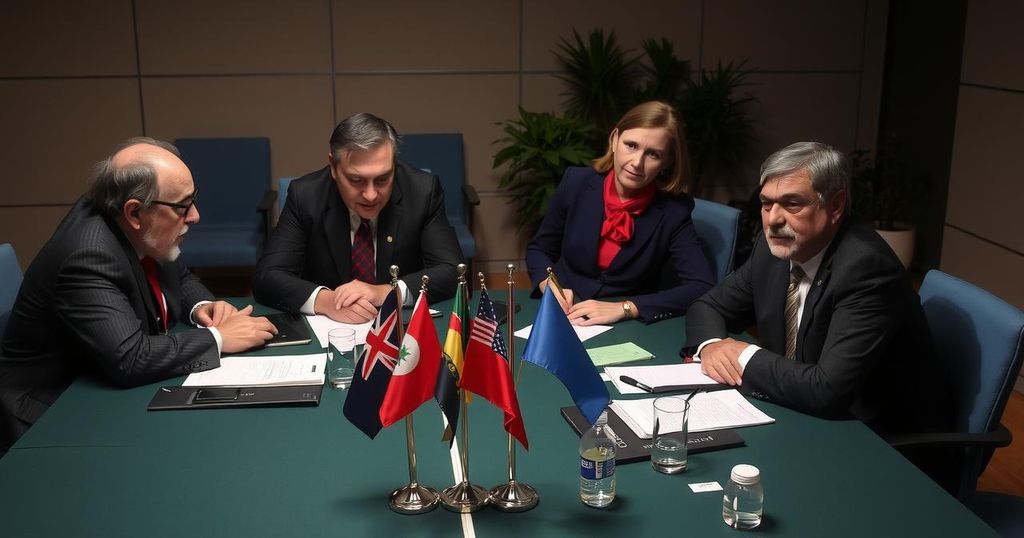Saudi Arabia’s Strategic Return to Lebanon: Aoun’s Presidency and Implications for Hezbollah
Saudi Arabia is re-establishing its presence in Lebanon through the election of Joseph Aoun as president, simultaneously diminishing Iranian influence. Crown Prince Mohammad Bin Salman’s support for Aoun’s disarmament efforts regarding Hezbollah is critical but faces challenges. The situation may evolve into a normalization of relations between Lebanon and Israel, pending changes in Israeli leadership.
Saudi Arabia is making significant strides in Lebanon amidst a noticeable decline in Iranian influence. Recently, a Saudi official, Prince Yazid Bin Farahan, arrived in Beirut ahead of the election of Joseph Aoun as Lebanon’s new president. This decision marks a departure from Riyadh’s previous cautious approach, highlighting the urgency of the situation. With Iran’s support for Hezbollah waning, the Saudi Crown Prince, Mohammed Bin Salman, has taken a decisive stance to secure Aoun’s presidency, signaling a new chapter in Lebanese politics.
Prince Yazid’s active engagement in meetings with top Lebanese officials prior to Aoun’s election underscores Saudi Arabia’s commitment to regaining its footing in Lebanon. Notably, he refrained from engaging with any Hezbollah representatives, reinforcing Riyadh’s message that Hezbollah remains in their crosshairs. The symbolism is evident with the new posters of Aoun alongside Crown Prince Mohammed Bin Salman displayed prominently throughout Beirut, showcasing the anticipated Saudi-Lebanese alliance.
Upon his election, President Aoun quickly expressed his intentions to visit Riyadh, while taking on the formidable challenge of addressing the disarmament of Hezbollah’s weapons from Lebanese streets. The feasibility of this endeavor remains uncertain, especially as Hezbollah maintains its narrative of national defense against external threats, particularly from Israel. Moreover, Iranian diplomatic elements in Lebanon have attempted to undermine Aoun’s candidacy, demonstrating the competing influences at play in the region.
Aoun’s election has been met with widespread support internationally, particularly from Washington, Paris, and the Gulf states, with Saudi Arabia tying its financial assistance to Lebanon’s rehabilitation to the disarmament of Hezbollah. The new president has publicly declared that only the Lebanese army should bear arms, but any successful implementation of this policy heavily relies on Hezbollah’s cooperation, which, as it stands, seems unlikely. Furthermore, both Aoun and MBS are waiting for potential changes in Israeli leadership, with eyes toward a broader normalization of relations between Lebanon and Israel under Saudi auspices.
The relationship between Saudi Arabia and Lebanon has been historically fraught, with periods of significant support occasionally interrupted by political strife and foreign influence. In recent years, Iranian backing of Hezbollah has complicated the geopolitical landscape, straining ties with Sunni-led Arab states like Saudi Arabia. As Iran’s influence wanes, particularly following military shifts in Syria, Saudi Arabia is poised to capitalize on this opportunity to reclaim its role in Lebanese affairs. The election of General Joseph Aoun as president reflects a strategic maneuver to establish a government aligned with Riyadh’s interests, while simultaneously challenging Iran’s longstanding foothold in the country.
In summary, Saudi Arabia’s renewed commitment to Lebanon, exemplified by its backing of President Joseph Aoun, marks a critical shift in the regional power dynamics. With substantial international support and a focus on disarming Hezbollah, the potential for a strengthened Saudi influence in Lebanese affairs is significant. However, the success of these measures hinges on active compliance from Hezbollah and the broader political landscape, including relations with Israel. As such, the future of Lebanese stability remains intertwined with the ongoing struggle for power between Saudi and Iranian interests.
Original Source: www.ynetnews.com








Post Comment